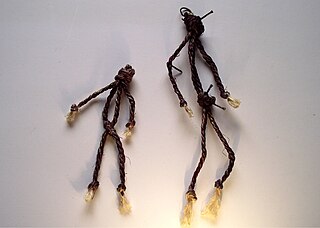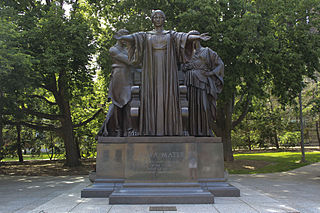Related Research Articles
-logy is a suffix in the English language, used with words originally adapted from Ancient Greek ending in -λογία (-logia). The earliest English examples were anglicizations of the French -logie, which was in turn inherited from the Latin -logia. The suffix became productive in English from the 18th century, allowing the formation of new terms with no Latin or Greek precedent.

Newfie is a colloquial term used by Canadians for someone who is from Newfoundland. Some Newfoundlanders, particularly those from the city of St. John's, consider "Newfie" as a slur used by American and Canadian military forces stationed on the island. The term also has its use in mid-to-late 20th century Newfie jokes that depicted "Newfies" as foolish, in particular when told in Canadian French, leading to the derogatory nature of the term. The word was first recorded in a 1942 dictionary of slang.

Chronos is a 1985 abstract film directed by Ron Fricke, created with custom-built time-lapse cameras. Originally released in IMAX theaters, it is now available on DVD, Blu-ray and HD DVD.
Random House Webster's Unabridged Dictionary is a large American dictionary, first published in 1966 as The Random House Dictionary of the English Language: The Unabridged Edition. Edited by Jess Stein, it contained 315,000 entries in 2256 pages, as well as 2400 illustrations. The CD-ROM version in 1994 also included 120,000 spoken pronunciations.

In military aviation, area bombardment is a type of aerial bombardment in which bombs are dropped over the general area of a target. The term "area bombing" came into prominence during World War II.
Stuart Berg Flexner (1928–1990) was a lexicographer, editor and author, noted for his books on the origins of American words and expressions, including I Hear America Talking and Listening to America; as co-editor of the Dictionary of American Slang and as chief editor of the Random House Dictionary, Second Edition.

In folk magic and witchcraft, a poppet is a doll made to represent a person, for casting spells on that person or to aid that person through magic. They are occasionally found lodged in chimneys. These dolls may be fashioned from such materials as a carved root, grain or corn shafts, a fruit, paper, wax, a potato, clay, branches, or cloth stuffed with herbs with the intent that any actions performed upon the effigy will be transferred to the subject based on sympathetic magic. Poppets are also used as kitchen witch figures.

A heliocentric orbit is an orbit around the barycenter of the Solar System, which is usually located within or very near the surface of the Sun. All planets, comets, and asteroids in the Solar System, and the Sun itself are in such orbits, as are many artificial probes and pieces of debris. The moons of planets in the Solar System, by contrast, are not in heliocentric orbits, as they orbit their respective planet.

"Apodictic", also spelled "apodeictic", is an adjectival expression from Aristotelean logic that refers to propositions that are demonstrably, necessarily or self-evidently true. Apodicticity or apodixis is the corresponding abstract noun, referring to logical certainty.
Irregardless is a word sometimes used in place of regardless or irrespective, which has caused controversy since the early twentieth century, though the word appeared in print as early as 1795.

A mill pond is a body of water used as a reservoir for a water-powered mill.

Pile is the raised surface or nap of a fabric, consisting of upright loops or strands of yarn. Examples of pile textiles are carpets, corduroy, velvet, plush, and Turkish towels. The word is derived from Latin pilus for "hair".
The lists of Merriam-Webster's Words of the Year are ten-word lists published annually by the American dictionary-publishing company Merriam-Webster, Inc., which feature the ten words of the year from the English language. These word lists started in 2003 and have been published at the end of each year. At first, Merriam-Webster determined its contents by analyzing page hits and popular searches on its website. Since 2006, the list has been determined by an online poll and by suggestions from visitors to the website.
The Hebraization of English is the use of the Hebrew alphabet to write English. Because Hebrew uses an abjad, it can render English words in multiple ways. There are many uses for hebraization, which serve as a useful tool for Israeli learners of English by indicating the pronunciation of unfamiliar letters. An example would be the English name spelled "Timothy", which can be Hebraized as "טימותי" in the Hebrew alphabet.

An alumnus or an alumna of a college, university, or other school is a former student who has either attended or graduated in some fashion from the institution. The word is Latin and simply means "one who is being nourished". The plural is alumni[aˈlʊmniː] for men and mixed groups and alumnae[aˈlʊmnae̯] for women. The term is not synonymous with "graduate"; one can be an alumnus without graduating. The term is sometimes used to refer to a former employee or member of an organization, contributor, or inmate.

A metatrochophore (;) is a type of larva developed from the trochophore larva of a polychaete annelid.
References
- ↑ "WordGenius". eis-usa.com. Retrieved 11 September 2014.